I bet a few letters of marque and reprisal issued to privateers could put a stop to that.
Russian Oil Flows Through Western ‘Price Cap’ as Shadow Fleet Grows – The New York Times

I bet a few letters of marque and reprisal issued to privateers could put a stop to that.
Russian Oil Flows Through Western ‘Price Cap’ as Shadow Fleet Grows – The New York Times
As a big ol’ security geek from way back, I find this fascinating:
They showcase instances of spiral letterlocking among the queens and posit that the method “spread across European courts through royal correspondence.”
Source: How European Royals Once Shared Their Most Important Secrets – The New York Times
I did not know there even was a National Postal Museum!
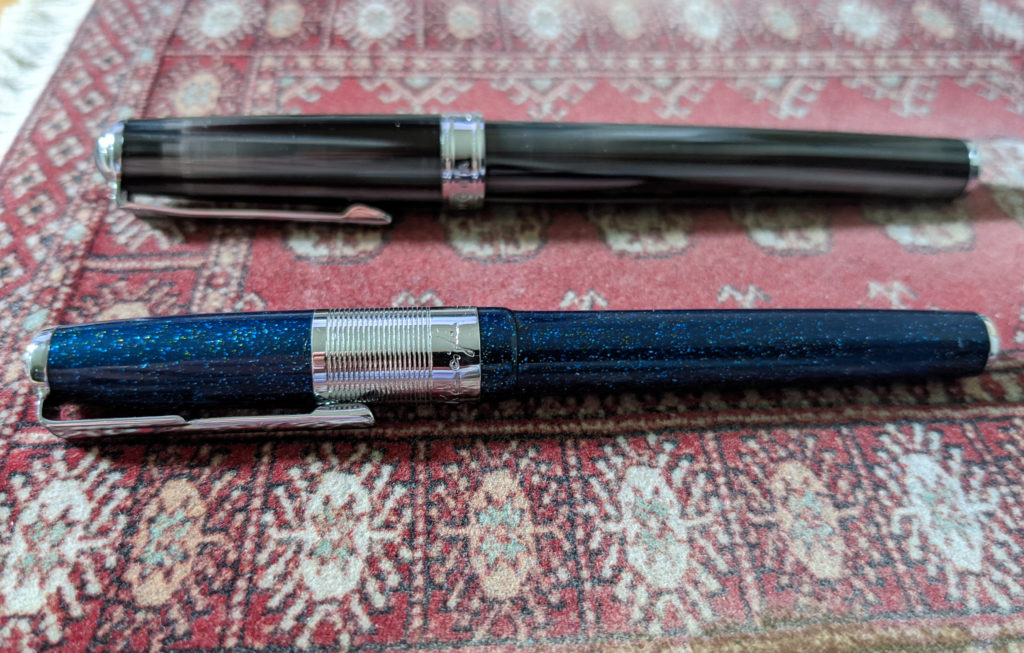
Today is National Handwriting Day. I need to write some letters.
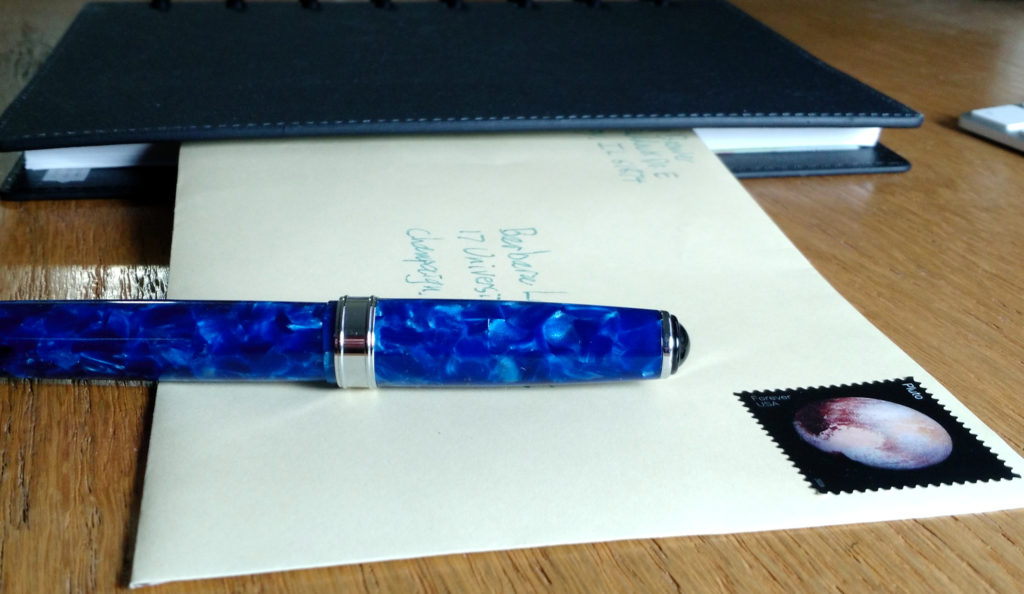 I think we should get some house stationery, but I really think we should name our house.
I think we should get some house stationery, but I really think we should name our house.
“House stationery … may be used by any resident of the house or by any guest during their stay. It’s typically personalized with the name or address of the house…”
Source: Summer Gift Idea: House Stationery – Crane Post Script
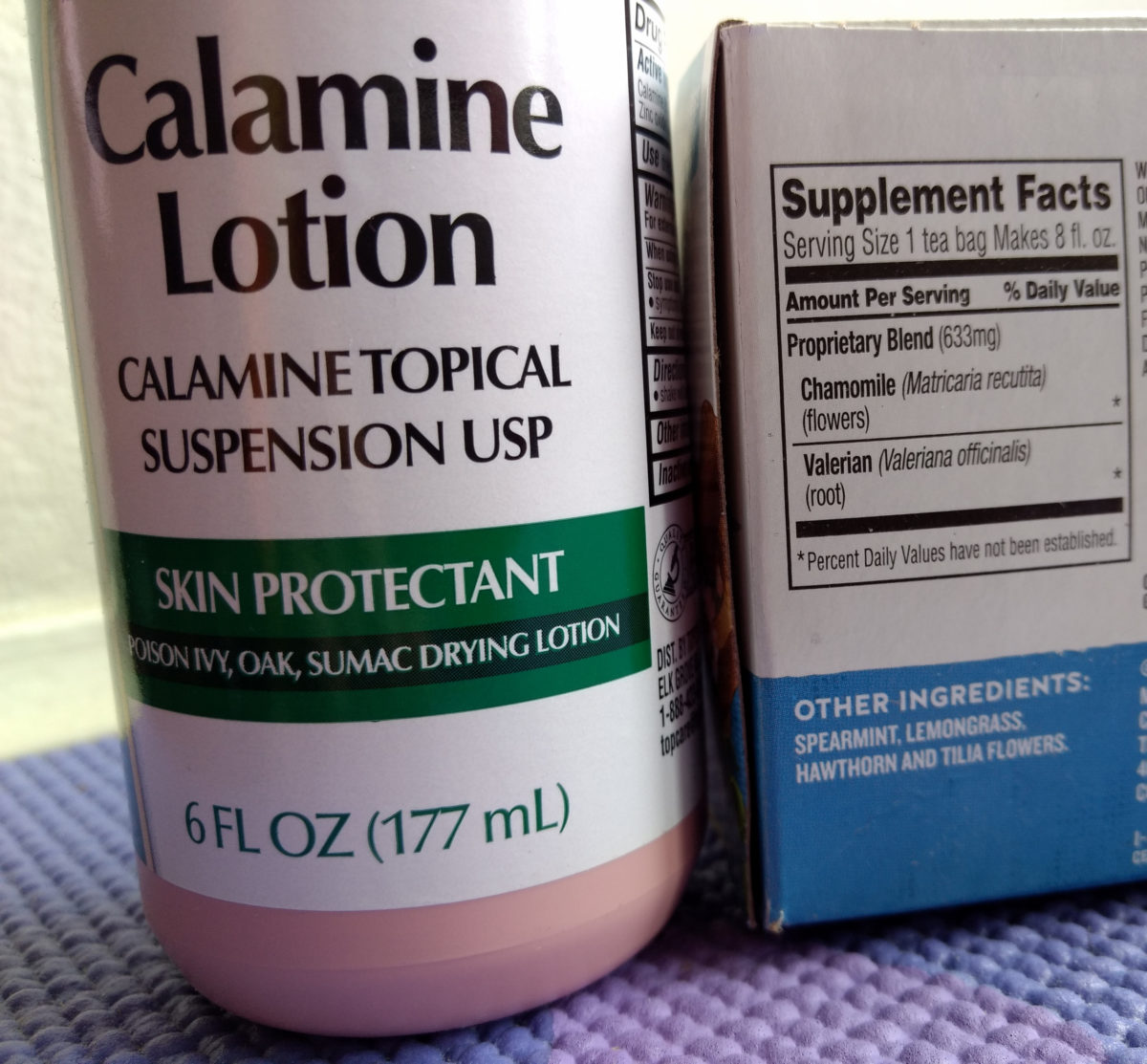
I had some initial difficulty in learning to read. My mom tried to teach me with some instructional material from a newspaper supplement, with no success whatsoever. I was a motivated learner, but the whole premise of the instructional material—which was based on phonics—made no sense to me at all.
I learned to read more or less all at once on the first day of first grade, when the teacher flipped through some big cards with words on them, together with pictures that were supposed to help indicate each word’s meaning. (I remember that “ball” was one of them, and that “go” was another.) I was stunned to realize that many of my classmates were ahead of me—they could read these words, and I could not.
But immediately, after just four or five cards, I grasped that the fundamental unit of reading was not the letter (which is what all that phonics-based stuff had implied). It was the word.
I was instantly off and running. I generally only had to be exposed to a printed word a single time to learn it. There were still a few (sufficiently frustrating to be memorable 50-plus years later) instances where adults refused to just tell me what a word was, trying to coach me through the process of “sounding it out”—something that I was never able to do—but within a day or two I was reading well above grade level and never looked back.
Even now phonics is only something I understand backwards. The spelling of English words is interesting in how it freezes in time a brief period in the midst of vast shifts in pronunciation, but I still find preposterous the idea that it’s easier to memorize sixty or eighty common spellings of the 40-odd phonemes that make up English, to learn dozens of common exceptions, and then to use that knowledge to “sound out” a word, than it is to just learn all the words.
In my experience, just learning all the words was trivially easy, while sounding a word out was virtually impossible.
I am given to understand that dyslexia is roughly the opposite of this. People with dyslexia are unable to make the jump to what is called “whole-word” reading, and are basically forced to stick with “sounding out” every word.
This is mostly important only in that I think it illustrates why it’s stupid to standardize on one way of teaching reading just because most people will learn to read just fine either way. Some people—me on the one hand, dyslexics on the other—will only be able to learn to read one way, and it’s not the same way.
Although it’s not important, I do have a recent illustrative anecdote to relate.
One side-effect of the way I perceive words is that I have no idea how they are spelled. It wasn’t until I was in college (and realized that I simply had to learn how to spell) that I bit the bullet and learned how to spell the only way that works for me: I need to memorize the list of letters that makes up a word. To this day, if I have not needed to write a word, I do not know how to spell it. For example, I did not know how to spell “Los Angeles” until after I moved there—and even then I didn’t learn it for several weeks until I had to write it down for some reason.
A related side-effect is that certain words that have similar shapes get conflated in my brain. Especially if they have somewhat congruent meanings, I will simply not realize that they are not the same word.
I mention all this now because a specific instances of it came up yesterday. Jackie had put calamine lotion on the shopping list, so I was picking up a bottle of the stuff. I read the label to see if the generic would be just as good as some brand-name version, and was surprised to see that “calamine lotion” is a specific thing: calamine topical suspension USP.
Reading the label so carefully made me realize for the first time that calamine is something different from chamomile. To my brain the words look an awful lot alike, and they’re both key ingredients in traditional remedies, so I had just slotted them in as the same thing.
Two asides here.
First, it was only while drafting this post that I realized that chamomile has that h as the second letter. As I said, if I haven’t written a word, I have no idea how it is spelled. This always made the suggestion that I should “look it up in the dictionary” to find the spelling especially frustrating. I remember attempting to follow that instruction once and then coming back to my dad some ten or twenty minutes later and saying that I had looked at every word in the dictionary that started with the letters “ax-” and yet had been unable to find “accelerate.”
Second, the brand-name stuff, because it doesn’t follow the USP formulary, isn’t even calamine lotion; it’s just some skin protectant lotion with a similar color that happens to have calamine in it. Who would want that?
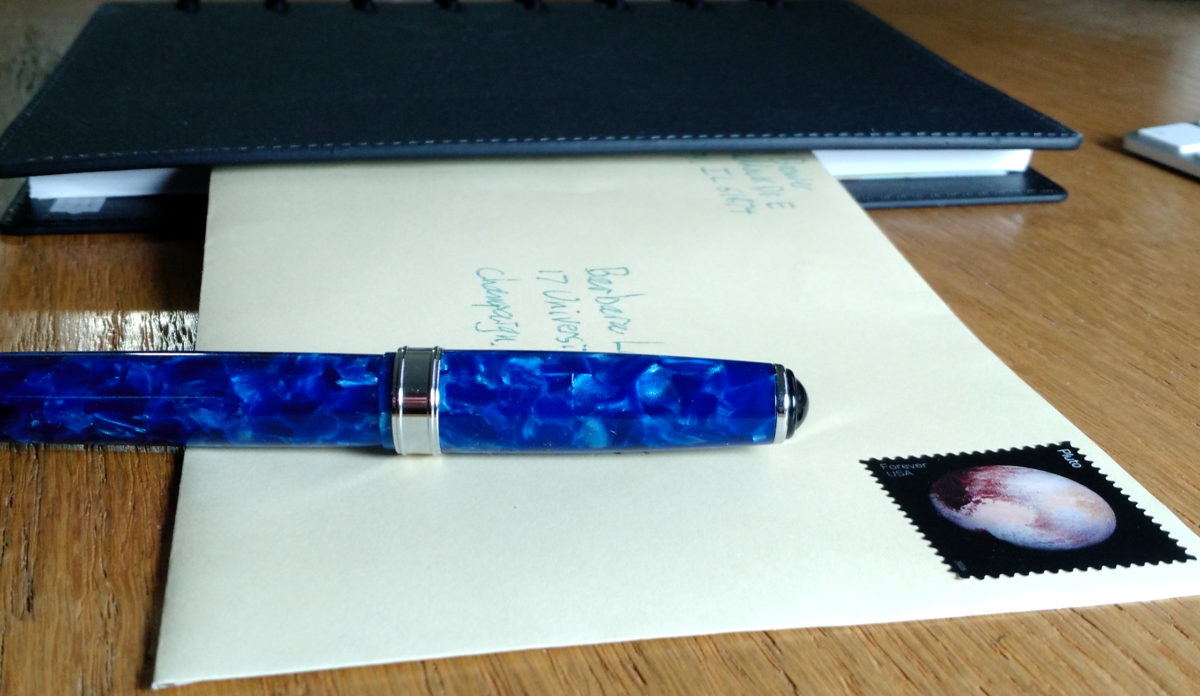
For a couple of weeks now, my brother and I have been exchanging actual handwritten letters. It’s been a lot of fun, as well as an opportunity to recover my ability to write in cursive.
By happy coincidence, today—just a couple of weeks after we started this quixotic venture of ours—is national handwriting day. (Picked because it’s the birthday of John Hancock.)
My handwriting, with just this much practice, is probably already better than it ever was. The reason is simple: I can spell. (I can’t spell especially well, but I can spell way, way better than I could in high school or before.)
It turns out that fudging your handwriting to obscure the fact that you can’t spell makes for really bad handwriting (without actually fooling anyone about your spelling).
Jackie likes to use pretty stamps when she sends a letter to an actual person. Since they don’t cost any more than ordinary stamps, she goes ahead and gets them preemptively, and if she doesn’t need them for letters to actual people, she just uses them to pay bills and such. Because of that, we had a nice stock of pretty stamps when this little venture started. So I’ve been able to use Star Trek stamps for most of my letters to my brother, a national park stamp for the letter to my aunt Wilma, and a Wonder Woman stamp for the letter to my mom.
Today we stopped at the post office and stocked up on more pretty stamps. It was kinda funny, looking at the choices and saying, “Two sheets of those, and one of those, and one of those, and one of those . . . .”
It’s not too late. You too can write a letter for national handwriting day. If necessary, backdate it a day and pretend it didn’t get finished until the post had already been collected.
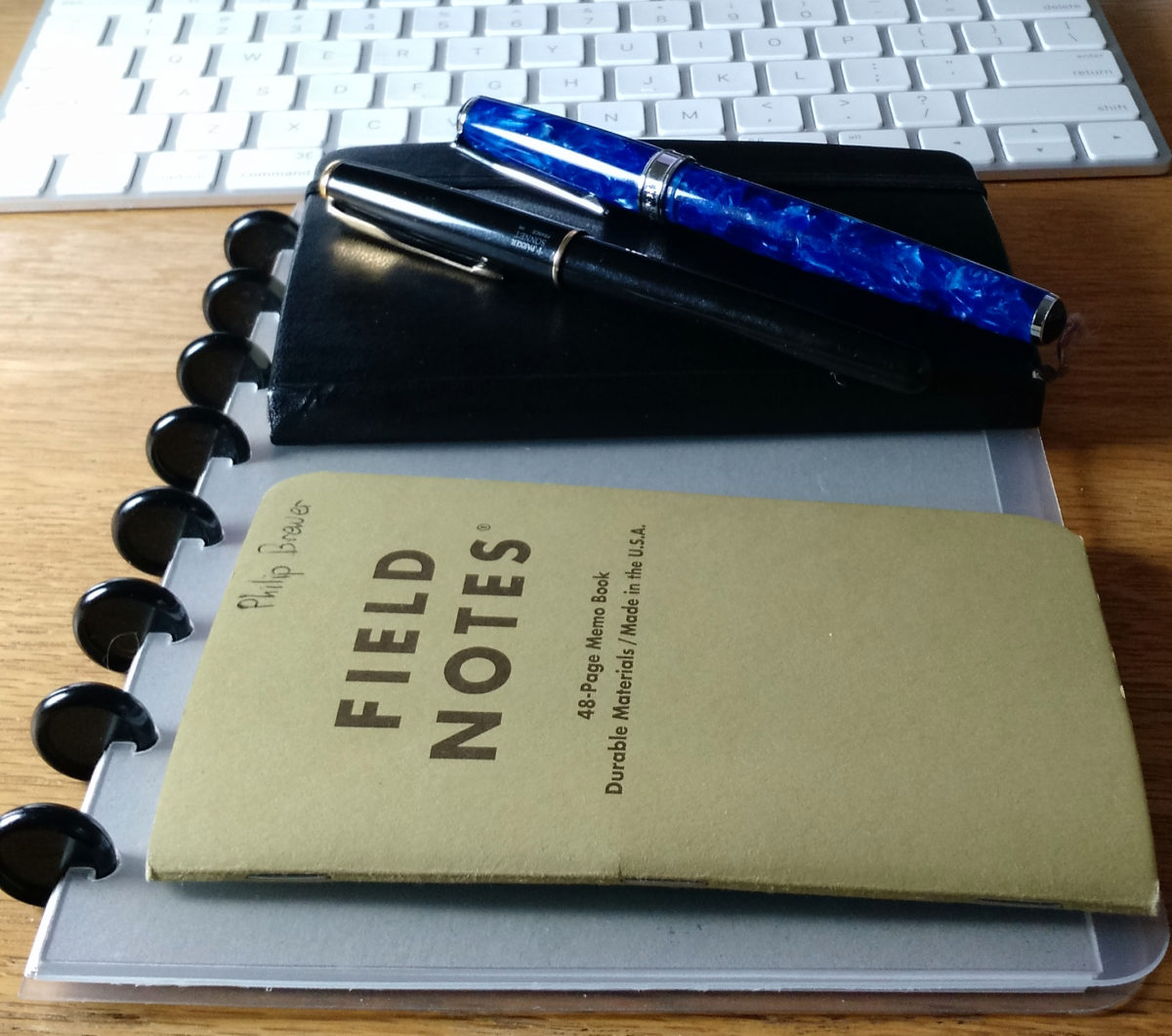
Several things came together to get me started with paper journals again.
My brother suggested that we might write one another actual paper letters. I think that was partially just because it’s fun to receive actual paper letters, but also because we’d been talking about reviving an idea we worked on a while back, for collaborating on an epistolary story in Esperanto, which would involve the characters writing actual paper letters, which put us in the frame of mind of thinking about letters.
At about the same time, Tobias Buckell wrote a post about starting a bullet journal, with links to a couple of videos (one a nice review of a particular notebook designed with bullet journaling in mind, the other a video on starting a bullet journal).
As an aside, let me mention that the main bullet journal site has the “reference guide” for bullet journaling translated into many languages, including Esperanto! (They want you to give them your email address and sign up for their newsletter to get the link to the reference guides.)
I’m perpetually vulnerable to diving too deep down this particular rabbit hole, geeking out over anything and everything related: notebooks, paper, pens, etc. Already I have:
I’m having great fun. It’s probably a big waste of time, but I’m finding it a at least a little bit useful:
I think Steven and I will continue writing one another, at least for a while; it’s fun! I’m continuing my bullet journal—I’m currently on day six. My handwriting has definitely improved.
Basically, it’s all good. Even if there are obvious advantages to just keeping stuff in a computer, it’s not as much fun, and why do stuff if it isn’t fun?